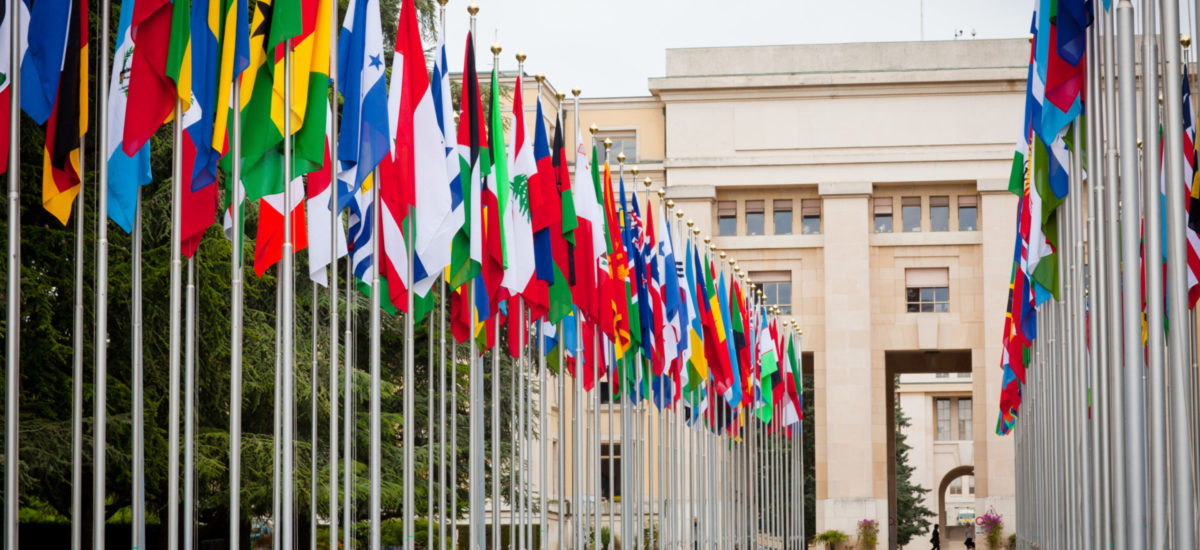Photo courtesy of UNOPS
Pressure on the government is growing in the run-up to a United Nations Human Rights Council session in February-March 2021. People in Sri Lanka, diaspora members, human rights activists and officials and politicians internationally have been calling for action on past and present abuses. This has intensified in the month before the 46th regular session of the UNHRC is due to begin on 22 February. The government withdrew from a previous deal and tough measures will be urged.
Criticism of the regime has been stoked by its unwillingness to make even token efforts on human rights, although leaders seem divided over this hard-line approach. Undermining of democracy, mistreatment of minorities and unwillingness to accept that it is accountable for what it does to those in its power have alienated some who might have been willing to seek consensus on next steps. It may perhaps intend, during the session, to announce some concessions on current abuses in the hope of fending off critics. The government may be counting on India, China or both to protect it from serious negative consequences. It may also hope to strengthen its hold by inflaming ethnic and religious tensions. But this is a high risk strategy.
Even limited measures would inconvenience some politicians when travelling or doing business overseas. Current allies will put their own interests first and may distance themselves or make increasingly burdensome demands. And amidst the social and economic turmoil caused by the coronavirus pandemic and longer term failure to address the needs of ordinary Sri Lankans, failure to convince possible partners that the country is well governed could be costly.
Above all if, by continuing to harm and humiliate minorities, President Gotabaya Rajapaksa and his faction manage to rekindle Tamil nationalism and Muslim extremism, this may backfire. He may hope to win support by posing again as the saviour of the Sinhalese Buddhist majority from a threat he has helped to manufacture, but people may tire of this. Despite attempts to control information and suppress dissent within Sri Lanka, news about the issues brought to the UN’s attention cannot be wholly suppressed. And if those from all communities seeking social, cultural and economic as well as political rights were to join forces, the current leadership’s control may be weakened.
Sri Lanka on the agenda
Early in the UNHRC session the Sri Lankan situation is due to be discussed with a speech by foreign minister Dinesh Gunawardena likely on 23 February. A highly critical report from the UN High Commissioner for Human Rights, Michelle Bachelet, may be up for discussion the following day. A Core Group on Sri Lanka made up of Canada, Germany, Montenegro, North Macedonia and the UK will probably move a resolution calling for tough action.
The High Commissioner’s report, published on 27 January and updated on 9 February, highlighted the failure to make progress. “The 30-year war between the Government and the Liberation Tigers of Tamil Eelam (LTTE), as well as earlier insurgencies in the south, were marked by persistent and grave human rights violations and abuses by both parties, including extrajudicial killings, widespread enforced disappearances, arbitrary detention, torture and sexual violence, which affected Sri Lankans from all communities,” she wrote. “Despite these serious violations, impunity prevailed.”
The report described a worsening situation over the past year with militarisation, weakening of democratic safeguards, politicians obstructing the criminal justice system, anti-minority rhetoric, the forcible cremation of Muslims who died of COVID-19, intimidation of civil society and new concerns, such as prison conditions in which COVID-19 could easily spread.
“Nearly 12 years since the end of the war, domestic initiatives for accountability and reconciliation have repeatedly failed to produce results, more deeply entrenching impunity and exacerbating victims’ distrust of the system,” it stated. Amidst “clear early warning signs of a deteriorating human rights situation and a significantly heightened risk of future violations”, “strong preventive action” was urged.
Faced with this situation, “Member States have a number of options to advance criminal accountability and provide measures of redress for victims. In addition to taking steps towards the referral of the situation in Sri Lanka to the International Criminal Court, Member States can actively pursue investigations on and prosecutions for international crimes committed by all parties in Sri Lanka before their own national courts, including under accepted principles of extraterritorial or universal jurisdiction.”
UNHRC members were encouraged to work with the High Commissioner, victims and their representatives “to promote such avenues for accountability, including by opening investigations into possible international crimes, and to support a dedicated capacity to advance those efforts. Member States can also apply targeted sanctions, such as asset freezes and travel bans against State officials and other actors credibly alleged to have committed or be responsible for grave human rights violations or abuses, as well as support initiatives that provide practical benefits to victims and their families.”
That strong measures would be called for was predictable given the history of unfulfilled promises and missed opportunities for reconciliation and protection of the vulnerable from misuse of power. Internationally-known human rights figures and political and civic leaders added their voices.
The Sri Lankan government was dismissive of the report. But it reflected a major failure of diplomacy, as well as uniting badly-treated minorities alienated by how they were treated.
At Independence Day celebrations in early February, the regime refused to include the singing of the National Anthem in Tamil as well as Sinhala, sending out the message to minorities that there was no place for them as equal citizens. Despite repression, thousands of people in the north and east took part in a five-day march for justice highlighting Tamil and Muslim concerns, although differences surfaced. For instance, some had sympathy for leaders of the defeated Tigers, while others sharply rejected the legacy of those who had ruled brutally and brought such suffering to so many.
On 10 February, there seemed to be a glimmer of hope when Prime Minister Mahinda Rajapaksa agreed that Muslims who died of COVID-19 could be buried in line with their religious tradition. But a day later this hope was cruelly dashed as the government backtracked on the pledge. This was also a humiliation for the veteran politician and there were media reports of deepening divisions within the government.
In the past, heightened international scrutiny has led at least to respite from human rights abuses in Sri Lanka, if not major reform. It is just possible that this small gesture of humanity to bereaved families might be saved up to be announced after the UNHRC session starts. But this is far from certain and would anyway probably not be enough to satisfy member states of the UNHRC of good faith on the part of a government that has repeatedly backtracked.
Then, after Pakistan’s Prime Minister Imran Khan had been scheduled to address parliament on 24 February during a two-day visit, this was abruptly cancelled. It had been a chance to develop better relations both with his state and other Muslim-majority countries. Possible reasons include Indian pressure in case he mentions Kashmir and fears he might raise the issue of burials. But the cancellation perhaps fed into the image of a defiant leadership ready to humiliate those seeking to build bridges.
The consequences of this uncompromising stance will become clearer in the week ahead.
Accountability: protection, truth-telling, peacebuilding rather than punishment
On 19 February, the Daily Mirror published an interview with M. A. Sumanthiran, a human rights lawyer, MP and prominent member of the Tamil National Alliance (TNA). He mentioned the “Crucial juncture now with the new government officially informing the UN Human Rights Council that they will not cooperate. Last February, they wrote a letter to that effect. And so now the Human Rights Council will have to take a decision as to what to do with the accountability measures and on reconciliation and long-term measures, whether they are going to continue to monitor Sri Lanka.”
He was upfront about violations by both sides during the civil war, as successive UN reports had shown: “Both sides committed violations of international law, that violations of international crimes violated the human rights law and international humanitarian law. So the international look into this matter has always concluded that both sides committed war crimes and crimes against humanity.” When asked if the TNA expressed regret for having backed the LTTE, Mr. Sumanthiran responded, “We have already done that” in 2012 and “Very clearly expressed regret for the crimes committed in the name of the Tamil people by various armed groups.”
In response to the question “Is digging up the past only going to further hamper the attempts to unite the communities in Sri Lanka?” he explained why he thought it so important to address what had happened as well as current insecurities: “In transitional justice, the first pillar is truth. Without the truth, you cannot move on to the other faces of reconciliation. Truth is found not for the purpose of punishing or any negative consequence. And I’m of the firm belief that the truth shall set you free… The South Africans often tell us to secure the future. If we were to translate that to our situation, frame a new constitution, change the rules of engagement, a new social contract by which you will live… The guarantee of non-recurrence, which is a final pillar of transitional justice, is as important as everything else.”
Despite many missed opportunities, he remained hopeful: “It is not that we are asking for anything that belongs to the Sinhalese or the Buddhists. They are the majority of this country and that position will not change. They are preponderantly the majority. But we must have equal status and I don’t think anybody can argue with that. So if those positions are explained to the Sinhala people they will agree that there must be a system of governance put in place that recognizes those who are numerically in the minority as well. So that is our belief. And several diaspora organizations back us on that.”
Whatever the outcome of the UNHRC session, it is highly unlikely to lead to a speedy improvement of the situation of Sri Lankans facing human rights abuses or at high risk. But it will draw attention to what is happening, maybe slow the downward spiral towards dictatorship by the President and anyone he favours and offer opportunities for those seeking a compassionate and just way forward.
Awareness and understanding of what has happened and is happening will be particularly valuable when the mood changes and more members of the Sinhalese Buddhist majority recognise that their own safety, wellbeing and dignity is linked to that of everyone else in the country. History has shown that violations against some communities can rapidly spread to others and violence flourish, at a terrible human cost.
Progress is most likely through a consistent stance on human rights, which highlights economic and social as well as political and cultural rights. What happens internationally can at least bear witness to the plight of many in Sri Lanka and support those courageously seeking change.


